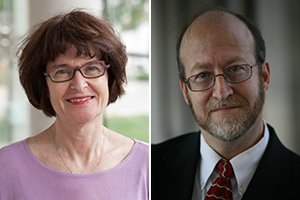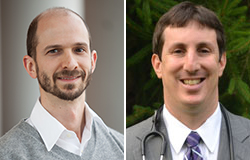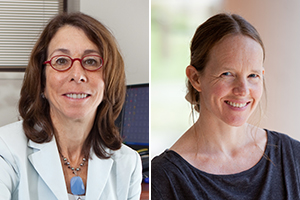

Physician-Scientists
Research Skills for Clinicians
Clinicians who feel that research skills would strengthen their medical careers have a dynamic learning opportunity in Einstein's two-year Clinical Research Training Program (CRTP), which offers a Master of Science in Clinical Research Methods.

Ellie Schoenbaum, M.D. (left), Paul Marantz, M.D., M.P.H."Our goal is to train physician-scientists," said Dr. Ellie Schoenbaum, CRTP director and director of medical student research at Einstein.
"The CRTP gave me tools for developing and studying interventions instead of just dreaming about what I'd do to improve care for my patients," said Dr. Aaron Fox, a 2012 graduate of the program and an assistant professor of medicine in the general internal medicine division at Einstein.
Dr. Fox studies the treatment of addiction to opioids, such as heroin, morphine and oxycodone, and co-directs the Bronx Transitions Clinic at Montefiore, the University Hospital and academic medical center for Einstein. The Bronx Transitions Clinic provides primary care, HIV care and opioid addiction treatment to former prison inmates.
"The designs of my clinical research projects are much more rigorous now," said Dr. Jason Adelman, a member of the CRTP class of 2006, as well as assistant professor of medicine in the hospital medicine division at Einstein and patient safety officer for Montefiore. Dr. Adelman researches ways to use technology to prevent medical errors.
While most CRTP applicants are physicians and fellows who continue to practice while in the program, in 2003 the program began accepting medical students, who earn an M.D., M.S. degree over five years.
The Mentor Connection

Aaron Fox, M.D. (left), Jason Adelman, M.D.The CRTP offers courses in epidemiology, biostatistics, data analysis, grant writing and research ethics to classes of up to 16 Scholars. But "where the rubber really hits the road is with the mentor—the content expert, the career role model," noted Dr. Schoenbaum.
Dr. Adelman's mentor was Dr. Brian Currie, assistant dean for clinical research at Montefiore and professor of clinical medicine and of clinical epidemiology & population health at Einstein. "He helped me put my writing for class into the context of what I was doing at work," said Dr. Adelman.
"Dr. Lawrence Brandt has been my mentor since I was a medical student at Einstein," said current CRTP Scholar Dr. Olga Aroniadis, who received her M.D. in 2008 and is a gastroenterology fellow at Montefiore. She studies the role of fecal microbiota in health and the pathogenesis of disease.
She added, "I entered the CRTP because I recognized that I needed a new set of skills in order to become a successful and independent clinical researcher. Dr. Brandt is incredibly encouraging and has allowed me to take the reins on the clinical research studies we're conducting."
A Popular Program
The CRTP was launched in 1998 by Dr. Paul Marantz, professor of clinical epidemiology & population health and of clinical medicine, and has steadily gained popularity. "We're now hearing from department chairs who want clinical researchers and mentors in their departments," said Dr. Schoenbaum, who took over from Dr. Marantz in 2007 when he became associate dean of clinical research education.
A big proponent of the CRTP is Dr. Ellise Delphin, professor and unified chair of anesthesiology at Einstein and Montefiore. "There wasn't much clinical research going on in our academic department when I arrived in 2010, and I wanted to create a group of well-trained faculty who could support our research mission," she said. "The program allows a clinician to continue to practice in a limited manner while acquiring a core education in clinical research, as well as critical thinking skills, resources and direction."
Another enthusiastic supporter is Dr. Liise Kayler, associate professor of clinical surgery at Einstein and attending physician at Montefiore. "In today's clinical practice, evidence-based medicine is hugely important," she said. "The CRTP provides an excellent foundation and formal training for outcomes researchers." She and Dr. Delphin have each recommended three clinicians to the CRTP.
Gains in Grantsmanship
The CRTP helps clinicians master one of the most important of all research skills: writing successful research proposals. 
Ellise Delphin, M.D., M.P.H. (left), Liise Kayler, M.D."Grant writing is a not an intuitive skill—you have to learn how to do it," explained Dr. Schoenbaum. "The mentors do a lot of editing work on their mentees' grant applications and pass along knowledge gained from their own experience in writing and obtaining grants."
One CRTP grad with a grant is Dr. Fox, who recently won a career development award from the National Institute on Drug Abuse to study access to and treatment with buprenorphine in former inmates addicted to opioids. "I probably wouldn't have a research career without the CRTP," said Dr. Fox.
Another grant-funded researcher is Dr. Adelman, who receives support for his patient safety work from the U.S. government's Agency for Healthcare Research and Quality. "I credit my success in getting funding to what I learned from the CRTP," he said.
Other successful CRTP grantees include Dr. Rebecca Madan, assistant professor of pediatrics, whose National Institutes of Allergy and Infectious Diseases grant supports her research on genital mucosal immunity in adolescent women, and Dr. Matthew Abramowitz, assistant professor of medicine and of epidemiology & population health, who won a grant from National Institutes of Diabetes and Digestive and Kidney Diseases to study inflammation, muscle wasting and physical function in chronic kidney disease.
An Expanding Network
The CRTP now has 179 graduates. "We're seeing a new generation of CRTP grads who are mentors themselves," said Dr. Schoenbaum. Those grads include Dr. Joe Verghese, CRTP class of 2001, professor in the Saul R. Korey Department of Neurology and of medicine, and Dr. Chinazo Cunningham, CRTP class of 2008, professor of medicine and of family and social medicine.
The CRTP is supported by a Clinical and Translational Science Award from the National Institutes of Health and funding from Einstein's Professional & Leadership Division (formerly the Men's Division).
Posted on: Wednesday, May 6, 2015

Tablet Blog